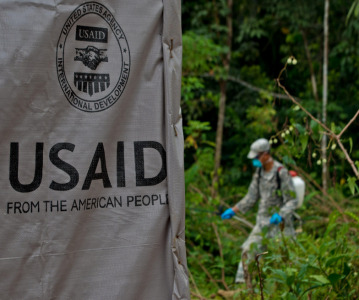The 2024 Pharma Outsourcing Forecast: strategic partnerships across global landscapes
.png)
For the pharmaceutical industry, outsourcing drug development, manufacturing, and research operations to contract organisations is not just a passing trend – increasingly, the partnership between drug sponsor and drug vendor is one of vital importance. For those pharmaceutical companies and biotechs looking to focus on their core competencies, pharmaceutical outsourcing partnerships are essential to smooth and efficient operations in the pharmaceutical supply chain. In fact, more than 50% of pharmaceutical executives anticipate their outsourcing activities to increase in the next 5 years.
These partnerships are dynamic, constantly evolving to meet the changing demands of the pharma industry. As the industry cycles through economic and operational booms and busts, attitudes towards outsourcing partnerships have shifted from transactions to strategic alliances for all parties involved. Our 2024 Outsourcing Forecast explores global trends in the pharmaceutical outsourcing sector. We seek to understand and evaluate what the future holds for outsourcing activities for pharma companies and contract organisations alike.
Topics covered in our 2024 Pharma Outsourcing Forecast include:
Integration and end-to-end services: Contract organisations are now offering a range of services across the supply and value chain. Such offerings incentivise a collaborative partnership for the drug sponsor with the vendor. By working with one contracted organisation throughout the drug product pipeline, a deeper and more intuitive relationship is fostered, past the monetary obligations for both parties. “Sponsors are picking companies that can do more for them,” states Stuart Needleman, Chief Commercial Officer & Chief Patient Centricity Officer at Piramal Pharma Solutions, for our report. “Other emerging strategies we often see are increasing emphasis on ESG, business resiliency, diversity and inclusion, and cybersecurity. This is a change from the past, where technical expertise trumped all else.”
The more the merrier – risk-sharing partnerships: While a collaborative relationship might be a more pleasant attitude towards any working partnership, economic and operational incentives are not completely gone. Sharing the risk involved with the development and manufacturing of a new drug product pushes both drug sponsor and vendor to uphold their end of the partnership. “For projects involving novel technologies, biopharma companies are more likely than in the past to co-invest with CDMOs on installation of necessary equipment and development of the needed expertise,” says Jason King, Director of Business Development at Ascend. “Similarly, in general, there is a trend towards more risk-sharing, particularly for early-stage projects, so CDMOs don’t get left empty-handed if a biopharma company halts a project mid-stream.”
Novo Nordisk’s Catalent acquisition: In February 2024, Novo Holdings announced their acquisition of Catalent, a publicly owned CDMO for US$16.5 billion. The holding company is the major shareholder of Danish pharmaceutical giant Novo Nordisk. Many experts believe the acquisition is driven in part by Novo Nordisk’s bid to solidify their manufacturing and distribution of GLP-1 products Wegovy and Ozempic. All eyes will be on outsourced manufacturing trends as some firms call for their own means of manufacturing, while others do not see the acquisition of a CDMO by an operating company becoming a trend. The next few years will keenly observe how drug vendors and contract organisations will respond to changing partnership dynamics and future merger and acquisition activities.
Relationships between pharmaceutical companies and CDMOs/CMOs/CROs are constantly evolving to meet shifting industry demands. Additionally, all stakeholders including shareholders, patients, and healthcare providers are forcing the pharmaceutical supply chain to re-evaluate a strategic partnership for their outsourcing needs. As Parexel experts Kerri McCaul-Claus, VP, Solutions Consultants & Biometrics, and Neil Berger, VP FSP Commercial and Operational Strategy state, “Both the contract organisation and the pharmaceutical partner should enter the agreement with a true intent to partner. You need a shared will, passion, and core drive to enable a healthy partnership to grow.”
Related News
-
News US FDA adds haemodialysis bloodlines to devices shortage list
On March 14, 2025, the US FDA published an open letter to healthcare providers citing continuing supply disruptions of haemodialysis bloodlines, an essential component of dialysis machines. -
News Women in Pharma: Manufacturing personal and team success
Our monthly Women in Pharma series highlights the influential lives and works of impactful women working across the pharmaceutical industry, and how the industry can work towards making the healthcare industry and workplace more equitable and inclusive... -
News Pfizer may shift production back to US under Trump pharma tariffs
At the 45th TD Cowen annual healthcare conference in Boston, USA, Pfizer CEO Albert Bourla outlined the potential for Pfizer to shift its overseas drug manufacturing back to the US as pharmaceutical industry players weigh their options against Presiden... -
News Experimental drug for managing aortic valve stenosis shows promise
The new small molecule drug ataciguat is garnering attention for its potential to manage aortic valve stenosis, which may prevent the need for surgery and significantly improve patient experience. -
News Women in Pharma: Connecting accessible pharma packaging to patients – a Pharmapack Special
Throughout our Women in Pharma series, we aim to highlight how CPHI events encourage discussions around diversity, equity, and inclusion initiatives in the pharmaceutical industry. -
News Vertex Pharmaceuticals stock jumps as FDA approves non-opioid painkiller
UK-based Vertex Pharmaceuticals saw their stock shares soar as the US FDA signed off on the non-opioid painkiller Journavx, also known as suzetrigine, for patients with moderate to severe acute pain, caused by surgery, accidents, or injuries. -
News Trump administration halts global supply of HIV, malaria, tuberculosis drugs
In various memos circulated to the United States Agency for International Development (USAID), the Trump administration has demanded contractors and partners to immediately stop work in supplying lifesaving drugs for HIV, malaria, and tuberculosis to c... -
News 2024 Drug Approvals: a lexicon of notable drugs and clinical trials
50 drugs received FDA approval in 2024. The centre for biologics evaluation and research also identified six new Orphan drug approvals as under Biologics License Applications (BLAs). The following list picks out key approvals from the list, and highlig...
Position your company at the heart of the global Pharma industry with a CPHI Online membership
-
Your products and solutions visible to thousands of visitors within the largest Pharma marketplace
-
Generate high-quality, engaged leads for your business, all year round
-
Promote your business as the industry’s thought-leader by hosting your reports, brochures and videos within your profile
-
Your company’s profile boosted at all participating CPHI events
-
An easy-to-use platform with a detailed dashboard showing your leads and performance








